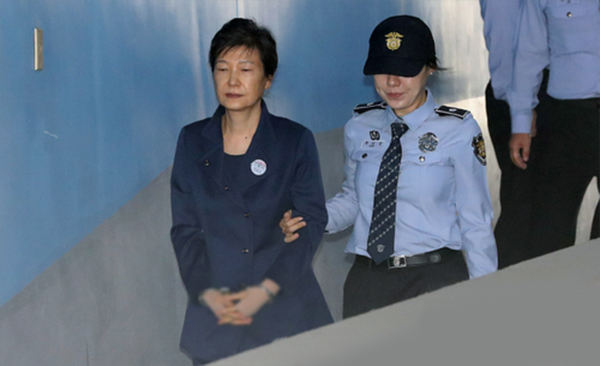On January 14, 2021, the South Korean criminal court issued the final verdict on the case against former President Park Geun-Hye. She was sentenced to 20 years in prison for several charges and fined 18 billion won for bribery. A total of 22 years of imprisonment was finalized, including the previous ruling of two years for violating the election law.
Before this criminal ruling, the South Korean Constitutional Court upheld the parliament’s indictment to impeach President Park on March 10, 2017. Some may praise the decision as a victory of democracy. However, the decision has significant problems and caused various controversies. A few issues are particularly worth mentioning here.
The fundamental problem of the impeachment decision is in fact-finding.
The constitutional court was under public pressure and made a political decision. Without comprehensive fact-finding, it rushed to impeach the President mainly based on claims brought forth by media, which were not verified through scrutinized investigation. Her criminal case examined the same claims after the impeachment. It thus became a situation where the criminal court was not expected to find facts different than what the constitutional court had assumed earlier. It is like carrying out a death sentence first and examining the case later.
The criminal court proceedings also had a number of problems. After the constitutional court’s decision on March 10, 2017, the prosecutor’s office requested that the court issue a detention warrant. President Park had been in custody since March 31. The first ruling was made on August 24, 2018. However, she gave up on her defense and has not attended any court proceedings since October 16, 2017. Why is that?
The first trial court held hearings four times a week, with each trial lasting more than 10 hours at a time. The court explained that there were many issues to inquire about. In addition to lengthy trials, the prosecutor’s report was 120,000 pages long. It was an extraordinarily unusual and unreasonable trial schedule that deprived the rights of the defendant and left the lawyers unable to prepare for the trial.
Article 14(3)(b) of the International Covenant on Civil and Political Rights (ICCPR) provides the right to have adequate time and facilities to prepare one’s defense in a criminal case. Time to prepare for a trial is the minimum right necessary for a fair trial. However, such things weren’t guaranteed to the former President’s criminal proceedings.
For instance, in a case where the court file amounted to 17,000 pages and the lawyers could not have adequate time to prepare, the European Court of Human Rights ruled that the right of defense was violated. (ECHR, Ocalan v. Turkey, paras. 147-148.)
The Human Rights Committee of the ICCPR also mentioned the importance of having adequate time for a defendant to prepare a trial (McLean v. Jamaica, HRC Communication 256/1987, para. 13.6.)
Another issue is the presumption of innocence. Everyone charged with a criminal offense shall have the right to be presumed innocent until proven guilty according to the law. (ICCPR Art 14(2)) However, her trial proceeded while she was in detention, and the court unprecedentedly extended it when the first six months of detention expired. In protest to the unfair trial process, President Park refused to attend the court proceedings. The case continued in her absence, and the final ruling was made on January 14, 2021. Whether one supports her or not, the criminal trial against former President Park violated the ICCPR, of which South Korea is a state party. It was a highly unusual case that would generally attract many human rights lawyers. However, no human rights experts, who tend to be liberal or left in South Korea, paid attention to this case.
Unfortunately, South Korean liberals embrace the pessimistic view of the country’s history, a nationalistic left-wing view of history. They assert the Republic of Korea was built by pro-Japanese groups with support from the capitalistic US. It is an illegitimate country that should not have been established. They also believe socialism is the answer for all Koreans. For them, President Park Geun-Hye is the daughter of a dictator and a symbolic figure of all pro-Japanese groups in Korea. For these reasons, bringing her down was the realization of historical justice. Many people, who led the democracy movement in the 1980s, are now in power and hold this view of South Korea’s history.
Despite the various problems of the trial, former President Park should have done her best to reveal substantive truth in the court. Because she gave up on the trial, the court’s proceeding continued in her absence. As a result, the court’s decision could not reflect all the aspects of the case.
In any case, the criminal court made its final verdict. The impeachment will now be evaluated only by history. Some say it is meaningless to raise this issue now because it has already been four years. However, regardless of one’s political stand, the discussion should be based on facts. Therefore, the Truth Forum continues to address the impeachment case because we hope that it will one day be reevaluated based on truth and without prejudice.
Revolutionists have always used disinformation, subversive agitation and wrath of the people as powerful weapons. French queen Marie Antoinette was charged with numerous allegations including raping her 8-year-old son and was executed on the guillotine. Although it took a long time, most of the allegations were proven false. There was no ground for her death penalty. I hope the truth about Park’s impeachment will be revealed one day, and it will not take as long as it did for Marie Antoinette.


